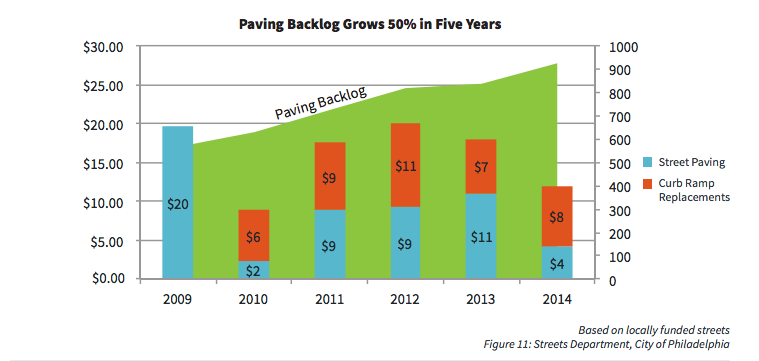This blog is part of our year-end “Why We’re Thankful” series, highlighting the Bicycle Coalition’s—and your—accomplishments of 2014.
Part of the reason we advocate for bicycle infrastructure is to keep everyone safe on the road—bicyclists, pedestrians and drivers. We advocate in plan view and behind the scenes to make sure our elected officials are advocating with us for better roads and, with them, a better Greater Philadelphia area.
One of the ways we’re working on doing that is getting the next mayor and City Council to enact a Vision Zero Policy.
Vision Zero is a targeted program to address dangerous locations in the cities with the goal of reducing all traffic injuries and fatalities by 50 percent by 2020—with the eventual goal of zero street deaths.
Crashes involving pedestrians, bicyclists and drivers cost the city about $1 billion per year—each road fatality averages out to $6.35 million, and each major injury is about $1.39 million, when costs associated with hospital bills, funerals, and damaged vehicles are taken into account.
Due to current funding and political realities, Philadelphia’s streets are dated and in desperate need of repair. The next mayor of Philadelphia needs to make safer and updated streets a high priority in order to vastly reduce traffic deaths within her or his administrative tenure.
Philadelphia is not investing enough in maintaining its street network. For the past several years, the city has had to divert a significant portion of its paving budget to upgrade curb cuts in order to meet federal requirements. Consequently, the amount of capital dollars put toward paving streets has declined precipitously since 2009. This lack of resources for the Streets Department has resulted in 900 miles of backlogged streets to be paved.

Vision Zero is not controversial, and public officials are ready to make our streets safer. Councilwoman Cindy Bass introduced a resolution on Thursday, Dec. 11, calling for hearings on a Vision Zero plan. She wants to cut traffic injuries in half by 2020—the same number and year we requested in our Better Mobility 2015 draft proposal.
Vision Zero is a policy that seeks to reduce all traffic deaths in a given area to zero in a given amount of time. Bass adds a number of potential ways to get to Vision Zero could eventually be implemented:
A Vision Zero approach to reduce traffic deaths has been adopted in two cities so far—New York City and San Francisco—and involves a wide variety of methodologies including but not limited to: narrower travel lanes to reduce car speeds, pinched intersections, raised crosswalks, more separated bike infrastructure, lower speed limits, and automated speed enforcement, as well as speed bumps, realizing that specific locations will warrant different strategies to assure traffic safety.
The resolution doesn’t do anything permanent yet. It actually authorizes two committees—the Joint Committees on Streets and Services and Public Safety—to hold hearings on strategies and methods to make this happen. Such policies, as we laid out in Safer Streets, could drastically reduce traffic deaths and make Philadelphia a less chaotic place to commute and travel.
The Bicycle Coalition and the people of Philadelphia couldn’t have made this accomplishment happen—or any of our accomplishments, for that matter—without your help. Vision Zero, especially, is an issue that we will need to continue working on throughout 2015 and beyond. We need your participation to continue our work. So, if you’re not yet, consider becoming a member of the Bicycle Coalition.

